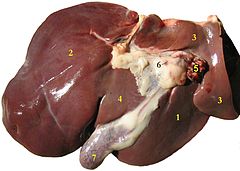

The liver is a vital organ present in vertebrates and some other animals; it has a wide range of functions, a few of which are detoxification, protein synthesis, and production of biochemicals necessary for digestion. The liver is necessary for survival; a human can only last up to 24 hours without liver function.[citation needed]
The liver plays a major role in metabolism and has a number of functions in the body, including glycogen storage, decomposition of red blood cells, plasma protein synthesis, and detoxification. The liver is also the largest gland in the human body. It lies below the diaphragm in the thoracic region of the abdomen. It produces bile, an alkaline compound which aids in digestion, via the emulsification of lipids. It also performs and regulates a wide variety of high-volume biochemical reactions requiring very specialized tissues.[2]
Medical terms related to the liver often start in hepato- or hepatic from the Greek word for liver, hēpar (ήπαρ).[3]
No comments:
Post a Comment